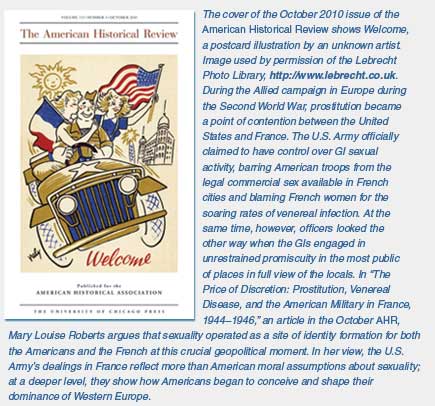 The October 2010 issue of the American Historical Review should soon be in members’ mailboxes. In it they will find articles on English abolitionism in the 17th century and on Britain’s exit from Iraq in 1932, and an AHR Forum entitled “Intimate Life and Sexuality in Mid-Twentieth-Century France.” The issue also contains five featured reviews and our usual extensive book review section.
The October 2010 issue of the American Historical Review should soon be in members’ mailboxes. In it they will find articles on English abolitionism in the 17th century and on Britain’s exit from Iraq in 1932, and an AHR Forum entitled “Intimate Life and Sexuality in Mid-Twentieth-Century France.” The issue also contains five featured reviews and our usual extensive book review section.
In “‘Out of the Land of Bondage’: The English Revolution and the Atlantic Origins of Abolition,” John Donoghue broadens our historical notion of unfree labor beyond African and Native American slaves, to include 17th-century English “bond slaves.” In doing so he reveals the early emergence of English abolitionism in the political debates over the status of “freeborn” Englishmen sparked by the “Glorious Revolution.”
“Getting Out of Iraq—in 1932: The League of Nations and the Road to Normative Statehood,” by Susan Pedersen, examines the only mandated territory to achieve independent statehood while under the jurisdiction of the League of Nations. That was Iraq, in 1932, although it was not granted a genuine form of independence. Instead, the British government sought to cloak its neoimperial arrangements in the Middle East under the noble rhetoric of self-determination and a specious transfer of formal sovereignty.
The AHR Forum provides an intensive set of case studies that resonate with the forum on “Transnational Sexualities” in the December 2009 issue. Whereas that forum highlighted transnationalism as an important source of scholarly innovation with respect to the study of sexuality, this forum places the transnational directly in tension with the national.
The U.S. Army’s regulation of prostitution in occupied France at the end of World War II is the focus of Mary Louise Roberts’s “The Price of Discretion: Prostitution, Venereal Disease, and the American Military in France, 1944–1946.” The management of sexuality was a crucial element not only of postwar transnational conflicts between the U.S. military and the French government, but also of the French government’s struggles to reestablish its control over France in the wake of Germany’s invasion and in the face of American occupation.
In “Comrades in the Labor Room: The Lamaze Method of Childbirth Preparation and France’s Cold War Home Front, 1951–1957,” Paula A. Michaels examines how Dr. Fernand Lamaze brought a revolutionary new technique of childbirth preparation back to France after a medical tour of the Soviet Union. The transit of the so-called “Lamaze method” to France—in advance of its extraordinary popularity once it crossed the Atlantic to the United States—reveals more than the transnational flow of medical ideas across Cold War barriers, as the relative merits of the “Lamaze method” also figured in postwar domestic debates between the French Communist Party and its political adversaries.
“Sex, Love, and Letters: Writing Simone de Beauvoir, 1949–1963,” by Judith G. Coffin, concerns an outpouring of confessional correspondence to Simone de Beauvoir in response to her publication of The Second Sex in 1949. This was an early phase in Beauvoir’s international celebrity, and especially in the articulation of feminist sensibilities and arguments by the ordinary people who took it upon themselves to write to her. Beauvoir’s global readership stood apart from the controversies she aroused in the French media.
“Sex, Sovereignty, and Transnational Intimacies,” Judith Surkis’s comment on the three articles, concentrates on the analytical relationship between the transnational and the national in the study of sexualities, as well as on the historical relationship between intimate sexualities and formal politics.
The December issue of the American Historical Review will include a forum entitled “New Perspectives on the Enlightenment.”
Robert A. Schneider, the editor of the AHR, is on sabbatical leave this academic year. Konstantin Dierks and Sarah Knott, on the faculty of the History Department of Indiana University and former associate editors of the journal, are serving as acting editors.
Tags: AHA Activities Scholarly Communication
Comment
Please read our commenting and letters policy before submitting.






